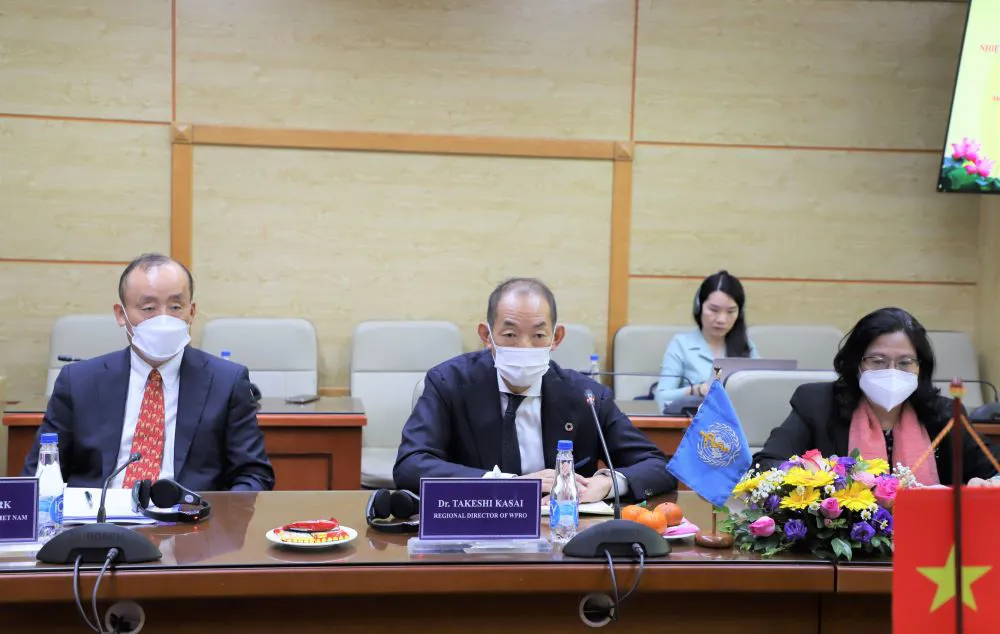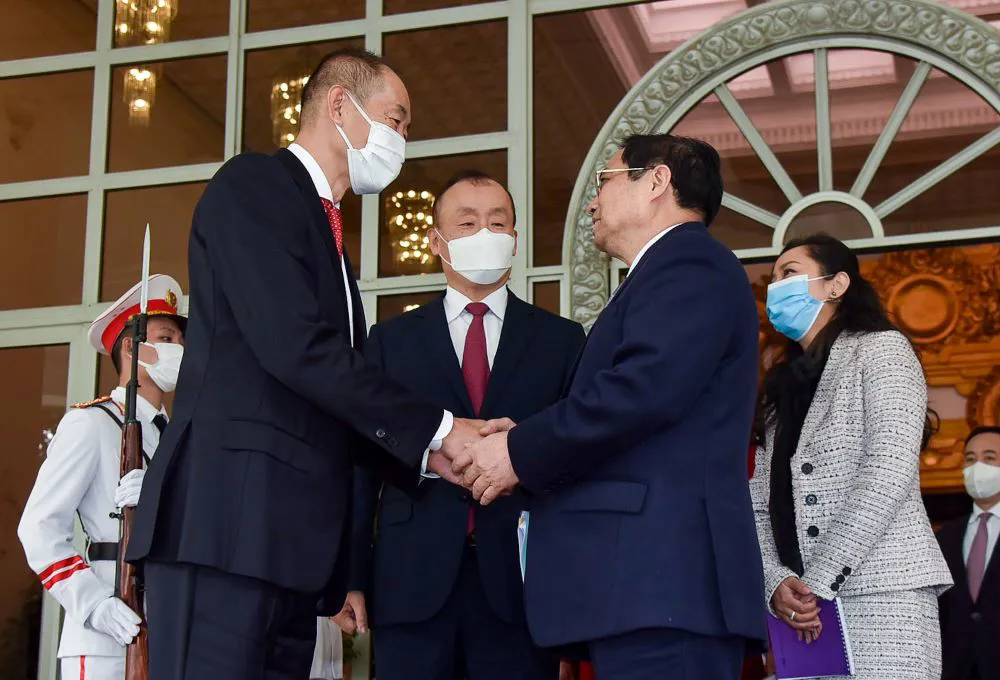Vietnam impresses WHO with door-to-door vaccination
Vietnam said the high vaccination coverage enabled it to switch to flexible adaptation to Covid-19.
Vietnam’s inoculation campaign with the door-to-door model has impressed Dr Takeshi Kasai, the World Health Organization (WHO) Regional Director for the Western Pacific (WPRO), who met Prime Minister Pham Minh Chinh in Hanoi on January 11.
The vaccination model, which was launched by Prime Minister Pham Minh Chinh during the ongoing outbreak that flared up in April 2021, is the way that medics go door-to-door to provide vaccination to housebound residents.
The model, together with the national strategy, has ranked Vietnam among the world’s six countries with the highest vaccination rate.
| Vietnam's Prime Minister Pham Minh Chinh (R) and Dr Takeshi Kasai, WHO Regional Director for the Western Pacific in Hanoi on Jan 11. Photos: VGP |
So far, nearly 100% of Vietnam’s population aged above 18 have been administered, 93.6% got the second jabs, and 11.5% were given booster shots. For children aged 12-17, 90% of them are single dosed and 68% double dosed.
Dr Takeshi Kasai expressed his impression of Vietnam’s high vaccination coverage, hailing Vietnam’s efforts in the inoculation drive that really worked in few months.
At the meeting, PM Chinh said Vietnam targets to complete providing the booster shots to all adults above 18 in the first quarter of 2022 and all children of 12-17 would be double dosed at the end of January. At the same time, it is consulting the WHO and other countries to vaccinate children 5-12 to soon bring them back to school.
The PM said the high vaccination rate has enabled Vietnam to switch to flexible adaptation to Covid-19 after months of movement restrictions. In the fourth quarter of 2021, Vietnam’s gross domestic product (GDP) expanded by 5%, bringing the whole year’s growth rate to 2.58%. Meanwhile, its import-export turnover in 2021 reached US$670 billion, ranking the country among the world’s top 20 countries with the largest trade revenue.
| Dr Takeshi Kasai (C), Dr Kidong Park (L), and Dr Tran Thi Giang Huong, Director, Division of Programmes for Disease Control, WHO Western Pacific Region when working with Vietnam's Health Minister Nguyen Thanh Long in Hanoi on Jan 11. Photo: MoH |
In 2022, Vietnam continues putting vaccine, drug, and people’s awareness as key measures for the economic reopening. For that reason, it will continue improving the grassroots health system, especially in big cities and high-density areas, in addition to bettering preventive health and health workers and encouraging the participation of the private health sector in the anti-pandemic mission.
In this regard, Vietnam expects more WHO support in the supply of Covid-19 vaccines and drugs, in approving homegrown kinds, improving medical capacity, sharing information and recommendations in the inoculation.
Vietnam highly appreciates WHO’s cooperation and support in strengthening the health system, preventing non-communicable diseases and other infectious diseases, elderly health, maternal health, mother and child, as well as promoting Vietnam’s integration into global health issues, communication, and medical supplies.
At the meeting, Dr Kidong Park, WHO Representative to Vietnam, said that Vietnam’s door-to-door vaccination is the most effective measure to improve vaccine coverage that both protects people’s health and maintains economic growth. He agreed with Vietnam’s policy in improving grassroots healthcare, preventive medicine, and strengthening health workers to not only prevent Covid-19 but also cope with the population ageing.
Dr Takeshi Kasai thanked Vietnam’s early donations of medical equipment to many countries at the beginning of the pandemic and its contributions to WHO and the WHO-led COVAX Facility. The health expert highly appreciated Vietnamese leaders’ strategies and vision in protecting people against Covid-19.
| Dr. Takeshi Kasai, a friend of Vietnam. |
Dr Kasai was WHO Representative to Vietnam in 2012-2014. He was also known for being a friend of Vietnam thanks to his support to the country’s health system and efforts in mobilizing donations from Japan and other countries for Vietnam in the pandemic fight.
He focused much of his work on preparedness and response activities for public health emergencies, including the threat of new and emerging infectious diseases such as MERS CoV and avian influenza A(H7N9). He prioritized support for the national immunization program to ensure expanded coverage of vaccines for major childhood diseases and advocated for improved communication efforts to ensure transparency and public trust in health services.
He also played a key strategic role in accelerating Viet Nam’s progress towards amending the Social Health Insurance Law and expanding sustainable health care financing. He worked with his noncommunicable disease team to build a fund for tobacco control and promote stricter laws to prevent road traffic injuries.
The health expert was awarded the “For the People’s Health” Medal by Vietnam’s Ministry of Health in 2014. The medal is a top honor given to people who have made significant public health contributions to Vietnam.














